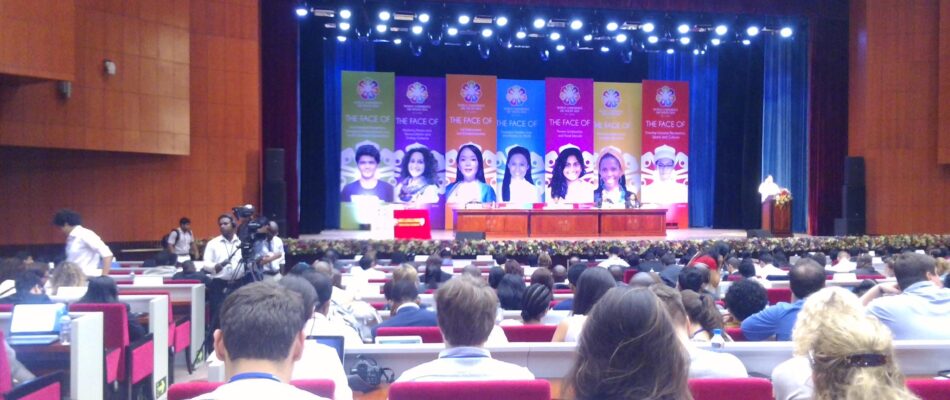
Global youth discusses the post-2015 development agenda
COLOMBO – Equally accessible quality higher education should be a clear goal in the post-2015 development agenda of the United Nations. This opinion was expressed by representatives of the European Students’ Union (ESU) at the 2014 World Conference on Youth, held in Colombo, Sri Lanka, from 6 to 10 May, with 1.500 youth delegates present.
The post-2015 development agenda is a follow-up on the work carried out under the Millennium Development Goals (MDGs) that will expire next year and defined aims for reducing inequalities and poverty in the world. Although poverty has partly been reduced, more children are in schools and gender equality has improved overall, the MDGs have not been completely fulfilled.
Gabriela Bergan, ESU’s Human Rights and Solidarity Coordinator, attended the conference in addition to representatives of national unions of students in Denmark, France, Iceland and Latvia. They pushed for this wish of students that was communicated in a resolution adopted at ESU’s 66th Board Meeting in the beginning of May.
Youth considered as equal stakeholders
Participants had high expectations for WCY 2014, as it was the first time that such a conference on youth was held in Asia. 87 per cent of the youth population lives in developing countries and about 65 per cent of the youth population is concentrated in Asia, while youth represent 17 per cent of the total world population. In addition, this was the first time that youth representatives were included as equal stakeholders in this United Nations negotiations procedure, expressed in the Colombo Youth Declaration.
The youth delegates discussed how the world’s inequalities could be reduced in relation to various themes: such as youth participation, globalisation, gender equality, access to quality education, employment and entrepreneurship, poverty and food and health security, environmental protection, peace and reconciliation, and inclusive recreations, sports and culture.
ESU’s contribution to WCY 2014
ESU took an active part in discussions on equal access to quality education and full employment and entrepreneurship, where it emphasised the multi-dimensional function of education that serves not only needs of the labour market but also supports an active citizenship and benefits society as a whole. The Colombo Youth Declaration is the outcome of a consultation between the youth delegates and the representatives of governments during this three day conference.
“The Colombo Youth Declaration was a success in the sense that the youth did have a say and was invited to the negotiation table. However, this declaration does not entirely reflect the youth’s concerns and views, especially on the issue of gender equality where governments avoid the issue of gender diversity. Only thirty governments took part in the negotiations out of which none was from Europe, which also raises questions about the representativeness of the declaration. Therefore, the participants also worked together on an annex to the declaration that does better reflect the wishes of today’s youth for the next fifteen years,” says Bergan.
— END —
For more information, please contact:
Rok Primozic, ESU’s Chairperson: +32/479.126.390 // rok@esu-online.org or Robert Hlynur Baldursson, ESU Communications Manager: +32/473.669.894 // robert@esu-online.org

The European Students’ Union, headquartered in Brussels, is the umbrella organisation of 47 national unions of students from 39 European countries. ESU represents and promotes the educational, social, economical and cultural interests of students at the European level. Through its member unions, ESU represents over 11 million students in Europe. To find out more about ESU, follow us on Twitter @ESUtwt, check out or Facebook page or visit www.esu-online.org. ESU celebrates its 30th anniversary in 2012.
